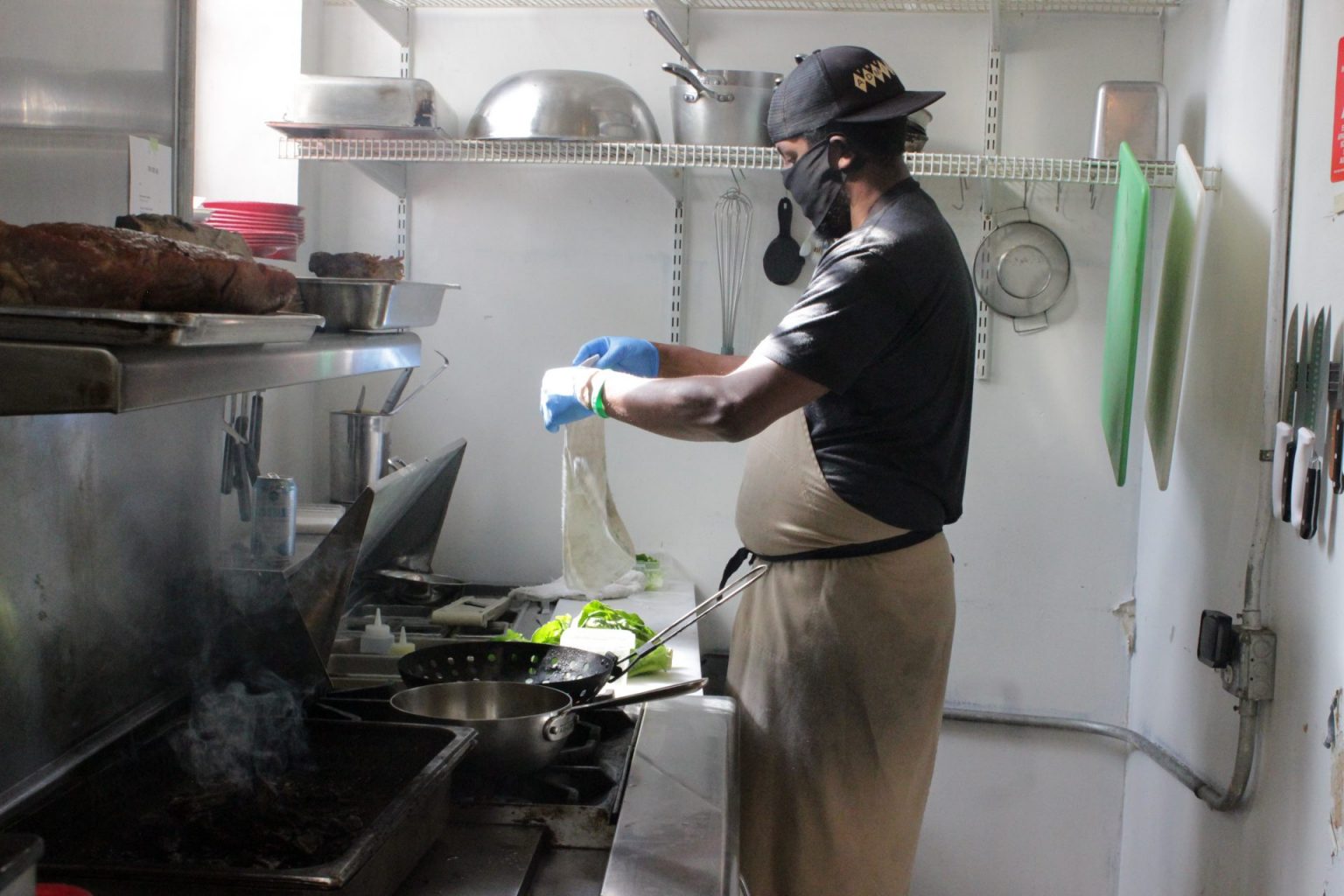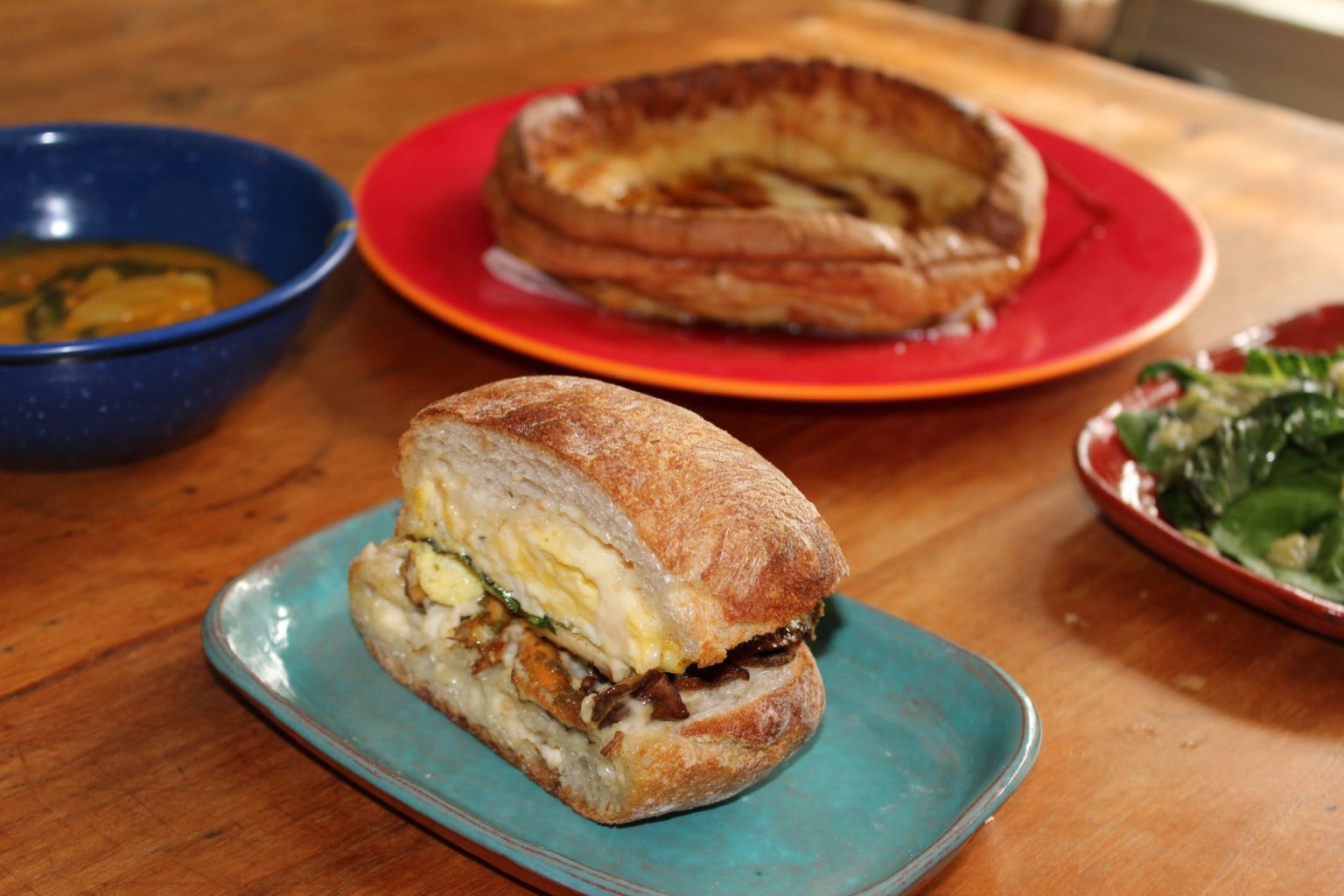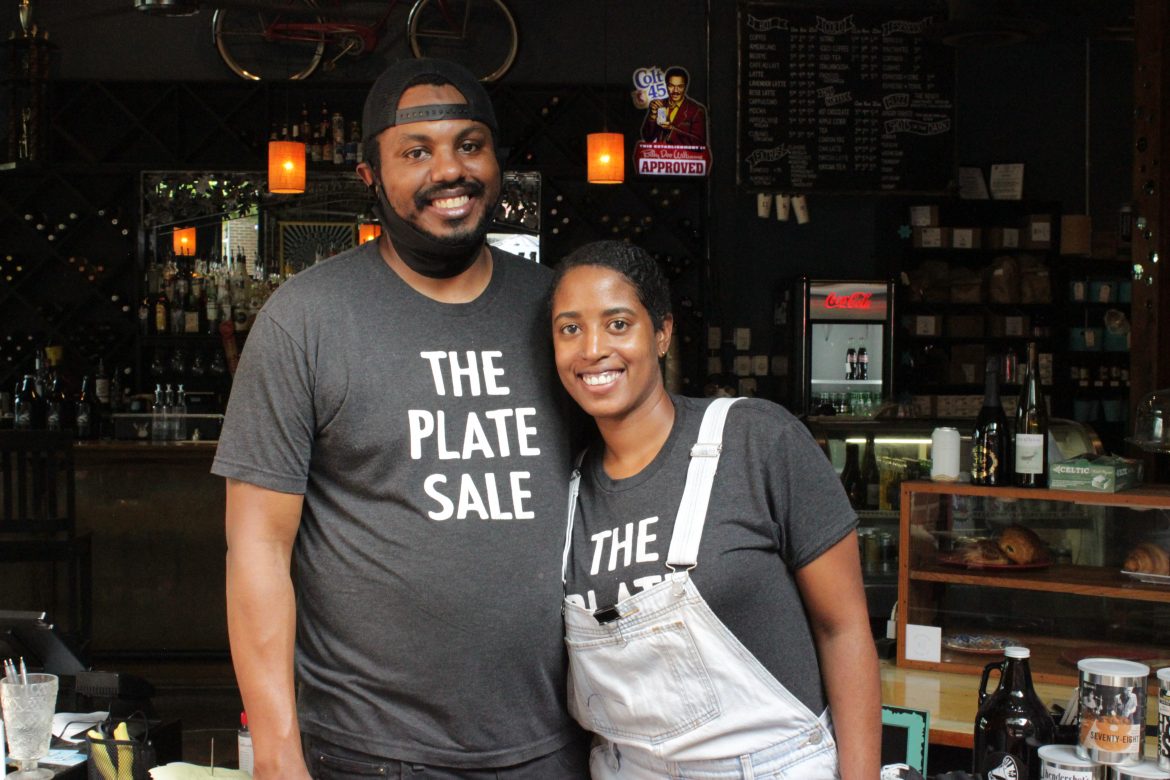Michael and Shyretha Sheats stand together at the Hendershot’s ordering window. The husband-and-wife duo are co-owners of The Plate Sale, a pop-up restaurant. “Take an ingredient that you may not see used (nowadays, but) to us, it is important because these ingredients do something more than just feeding, just eating. It was a way that our grandmothers and those before them fed their families. It was something that they may have preserved to make sure they had food on the tables when there wasn’t any food around,” Shyretha said. Photo by Emma Scott
Co-owners of The Plate Sale, Shyretha and Clarke Central High School 2002 alumnus Michael Sheats, are a husband-and-wife duo who turned their pop-up side business into a full-time restaurant to support themselves once COVID-19
hit. Since then, The Plate Sale has grown into an Athens favorite.
In 2017, The Plate Sale began as a pop-up that took over the kitchens of restaurants in Charleston, South Carolina, Atlanta and Athens for a short residency. The Sheatses took the idea of a plate sale, a southern community event in which a plate of food is sold at one set price, and elevated it. Now offering to-go meals out of the kitchen at Hendershot’s, a coffee shop, bar and live music venue on Prince Avenue, The Plate Sale serves southern-inspired meals using traditional methods of cooking.

Co-owner of The Plate Sale Mike Sheats folds a towel in the Hendershot’s kitchen. Mike says that he is in a constant cycle of last-minute improvised planning for tomorrow’s menu. “We start our day here between 9:00 and 9:30 and we’re here until about 5:00. Then, we go pick up our daughter, go home, figure out what we are going to do for the next day, lie down and do it all over again,” Mike said. Photo by Emma Scott
The Sheatses always dreamed of owning a restaurant of their own. The global pandemic forced them to find a constant location and income, bringing them closer to their goal.
“Once the pandemic happened, we were laid off from our jobs. That’s when we (had) to do something full time on our own to be able to make it,” Shyretha said. “(The pandemic) is kind of like one of those blessings in disguise (for our business). It’s forced us to take (The Plate Sale) on and do things that we’ve just been talking about. I don’t know if we would have moved as fast as we are without it happening.”
Due to the safety and financial restrictions of the pandemic, the Sheatses are currently the only staff members working the The Plate Sale.
“We’re the dishwasher, bartender, cook, chef, email response, print menus, forms (and) social media. That’s just us. We have had a staff in the past but since the pandemic, it just doesn’t make sense,” Michael said.
The Plate Sale locally sources most of its ingredients from within a 20-mile radius. To Michael, this concept is very meaningful.
“It’s always been our approach of being sustainable, before the farm-to-table movement. People lived like this every single day, like people farmed on their lands — it was a way of survival. It’s not just like, ‘We’re gonna go out to eat at this great new farm-to-table restaurant opening tonight.’ This is real life,” Michael said
The Sheatses’ mission is to preserve traditions of Black culture through sustainably-farmed food. Michael graduated from Le Cordon Bleu in Atlanta and brings a culinary school sensibility to ancestral cooking methods while sharing personal anecdotes with their customers.
“If you dine with us, there’ll be definitely a lot of storytelling around Black culture, family traditions, ways of living (and) sustainability. (We want to showcase) practices that we have seen that may become extinct at some point, or that may become not as relevant in the way we live now,” Shyretha said.
According to Michael, these plate sales have been around for far longer than he has. In the communities where the Sheatses grew up, Michael in Athens and Shyretha in Carrollton, Georgia, plate sales were popular and served as community gatherings.
“We wanted to create something that was familiar and something that we connected to. (It) even goes deeper, even before us.”
— Michael Sheats,
Co-owner of The Plate Sale and Clarke Central High School 2002 alumnus
“We wanted to create something that was familiar and something that we connected to. (It) even goes deeper, even before us,” Michael said. “Most people after they left the South after slavery wanted to (start a new life.) They might have settled in North Carolina and needed to get to Chicago, and they knew how to cook, so they may have held a plate sale to make some money so they could get up to Chicago. That’s kind of where we get the inspiration from.”
Hendershot’s Bartender Reed Helman works closely with the Sheatses and has gotten to know them since they have been operating out of Hendershot’s, since March. Helman is impressed by the Sheatses’ attitude under the pressure of the food service industry.
“I (admire the Sheatses’) ability to be resilient, especially in a time of crisis. They just have the right mindset of if there’s a bad day, they don’t let it get to them. They know a good day is bound to happen tomorrow,” Helman said. “Food is a pretty hard industry, and they just don’t let it get to them.”
Helman believes that The Plate Sale’s popularity is due to the Sheatses’ ability to create new dishes and flavors every day.
“The menu is never really the same. I feel like that is intriguing to people because they have a wide range of (new dishes) that they’re trying to do and they all turn out (delicious),” Helman said.

A Maitake mushroom sandwich sits on a plat surrounded by other foods. While the meals Mike serves could be considered simple, there is usually a much more complex recipe behind them. “Simple doesn’t mean easy. I could easily pick a piece of lettuce in front of you, but I may have chopped down a sauce for it that took an hour to make,” Mike said. Photo by Emma Scott
Michael takes inspiration from self-published and professional cookbooks that he has collected. He combines Southern home-style dishes and bygone cooking methods with sophisticated ingredients to create something that is both reminiscent of the past and cutting edge.
“I use (vintage cookbooks from thrift stores and relatives) as inspiration, but I do it a little bit different. We looked at a lot of old recipes and some of the old ways of cooking like cooking over fire before we had conventional stoves with gas and (electricity). All those cooking ways are kind of coming back now,” Michael said.
Shyretha expected their qualifications and talents to be enough to get a larger customer base, but the pandemic has
presented problems.
CCHS 2014 alumnus Matthew Ward, a Hendershot’s regular, says that The Plate Sale enhances Hendershot’s atmosphere.
“Now with (The Plate Sale) serving delicious food in meal portions, Hendershot’s has restaurant capacity and complete accommodation for any type of customer,” Ward said.
Since The Plate Sale began pop-ups in 2017, the business has adapted from a casual way to showcase their unique flavor to being the Sheatses’ sole source of income with a goal of establishing a brick-and-mortar restaurant.
“We knew that (The Plate Sale) would pay tribute to traditional plate sales and fish fries and things like that that we would see when we were younger, but we didn’t know that it would evolve into this business concept that we see ourselves running forever,” Shyretha said.
Story by Emma Scott
Package by Ireland McCage
